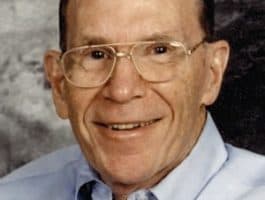
What is Sin?
Ungodliness is ultimately at the core of our sin. Author Jerry Bridges talks about what makes a sin a sin.
Show Notes
About the Host
About the Guest
-
Ungodliness is ultimately at the core of our sin. Author Jerry Bridges talks about what makes a sin a sin.
-
Dave and Ann Wilson
Dave and Ann Wilson are hosts of FamilyLife Today®, FamilyLife’s nationally-syndicated radio program. Dave and Ann have been married for more than 38 years and have spent the last 33 teaching and mentoring couples and parents across the country. They have been featured speakers at FamilyLife’s Weekend to Remember® marriage getaway since 1993 and have also hosted their own marriage conferences across the country. Cofounders of Kensington Church—a national, multicampus church that hosts more than 14,000 visitors every weekend—the Wilsons are the creative force behind DVD teaching series Rock Your Marriage and The Survival Guide To Parenting, as well as authors of the recently released book Vertical Marriage (Zondervan, 2019). Dave is a graduate of the International School of Theology, where he received a Master of Divinity degree. A Ball State University Hall of Fame quarterback, Dave served the Detroit Lions as chaplain for 33 years. Ann attended the University of Kentucky. She has been active alongside Dave in ministry as a speaker, writer, small-group leader, and mentor to countless wives of professional athletes. The Wilsons live in the Detroit area. They have three grown sons, CJ, Austin, and Cody, three daughters-in-law, and a growing number of grandchildren.
-

Jerry Bridges
Jerry Bridges was a longtime staff member of the Navigators and served with their collegiate ministry. In addition to his international speaking ministry, he authored numerous books and devotionals; among them The Pursuit of Holiness, which has sold well over a million copies, and the award-winning The Discipline of Grace and I Will Follow You, O God. Jerry Bridges died on March 6, 2016. He was 86 years old.
Ungodliness is ultimately at the core of our sin. Author Jerry Bridges talks about what makes a sin a sin.
Bob: This is FamilyLife Today for Wednesday, February 18th. Our host is the President of FamilyLife®, Dennis Rainey, and I’m Bob Lepine. Ungodliness is at the root of all kinds of sins, including respectable sins. It’s those kinds of sins we’re going to talk about today. Stay tuned.
1:00
And welcome to FamilyLife Today. Thanks for joining us on the Wednesday edition. At the risk of embarrassing our guest today, you know the name J.C. Ryle?
Dennis: Yes.
Bob: He is the Anglican bishop who lived more than 100 years ago in England, who wrote a number of books that we still read and benefit from today. I have often wondered, “Whose books, that are being written today, will still be read 100 years from now and will be appreciated the way Bishop Ryle’s books are?”
And I have to tell you that I think my grandchildren may be talking about this guy, who lived way back in the late 1900s, in the earliest part of the 21st century—this guy named Jerry Bridges. I think they may still be reading books like The Pursuit of Holiness or The Practice of Godliness or the book—
2:00
—we’re going to talk about today, Respectable Sins. I think these books may stand the test of time.
Dennis: I think you’re right, Bob. And Jerry was on our broadcast about a decade ago, and his Christian life has withstood the test of time—with tongue in cheek I say that. He's been on staff with the Navigators for more than 53 years—has been a faithful steward of the gospel. It is fun to have you back in the studio, Jerry. Welcome back to FamilyLife Today.
Jerry: Well, thank you, Dennis. It’s a privilege to be here.
Dennis: You have written this book called Respectable Sins. I’m with Bob—I think a number of your books are going to withstand the test of time. And I just have to ask you—this was one of the questions I was looking forward to asking you about this—in your lifetime, how have you seen the concept of sin change?
Jerry: Well, I would say that, with all of the increase in the flagrant sins out in society—
3:00
—the abortion, homosexuality, the drug dealing, and the easy divorce, and these kinds of things—that the Christian community has that as their target: “That’s sin.” And they don’t see their gossip, and their pride, and their jealousy as sin. I would say that's been a big thing—in other words, society has gone downhill.
I think that Romans—the latter half of Romans, Chapter 1, from verse 18 on—“God gave them up…. God gave them up…. God gave them up,” is so descriptive of what we see in society today. And so, those of us, who are believers, can look at that and fail to see our own sin.
Dennis: A.W. Tozer, who was another great writer, said that he believed the low view of God has given birth to a low view of sin.
Jerry: Absolutely. Yes, I agree with that.
4:00
One of my favorite passages of Scripture is Isaiah’s vision of the holiness of God in Isaiah, Chapter 6. Isaiah was a good man. He had access to the kings. He was part of the Jewish elite—these kinds of things—and yet, when he saw the holiness of God, he said, “Woe is me!”
Peter—after Jesus had told him to cast his net on the right side and get this huge catch of fish—we might say: “Well, Jesus, I’ll sign you up. You be our fishing guide, and we’ll give you half the profit,” or something like that.
Dennis: Right; right.
Jerry: He fell on his face and said, “Depart from me, God, for I am a sinful man.” So, when we see God as He really is—and that’s what he saw—he saw the sovereign power of God in Jesus that day, and it scared him. And, well, I would say today—I would say one of the characteristics of our society / our Christian society today is there is no fear of God.
5:00
By that, as you know, that doesn’t mean to be afraid of God. It does mean to have a very reverent awe of God.
Bob: And you’d say that characterizes the evangelical community?
Jerry: I would say so—yes. We want God to be our buddy. God rebukes the nation of Israel in Psalm 50. He said, “You thought that I was altogether like you”; and so, we make God in our own image. We know He’s more powerful, He knows more, and so forth, but basically—
Bob: The Bible does teach there is an eminent—
Jerry: Right.
Bob: —relationship that we can have with a holy God; right?
Jerry: Right. This has to be both the transcendence and the eminence, and the transcendence has been lost.
Bob: I think it's interesting that you talked about how we tend to look at these manifestations of sin in the culture and say, “Look at how bad things are”; and we fail to see sin patterns in our own lives.
6:00
It’s a little reminiscent of Luke 18, where the Pharisee looks around and says, “I thank You that I am not like other men.” Is that what we’ve become; do you think?
Jerry: I think so. In fact, I would say you go one step further. I don’t even think that they’re thanking God. Now, I don’t think that he was really thankful to God—I think that was just an expression. Basically, what he was saying is: “God, look how good I am. I don’t do this, this, that, and so forth—and, you know—especially, this tax collector over here.”
Bob: You tell a story in the book, Respectable Sins, about a meeting of a group of church leaders or pastors, where there was a time of confession of sin. The sins that were being confessed were all other people’s sins; right?
Jerry: Right, yes. Actually, the story was—this pastor called a prayer meeting for men in the church. He was fairly new in the church; and so, he wanted to get acquainted with the men and called this prayer meeting.
7:00
He just said, “Let’s pray around.” He told me that every man, without exception, prayed about the sins in the culture—none of them prayed about their own sins / none of them prayed about the ministry of the church—they were just so concerned. When it finally came to him, his closing prayer was, “God, be merciful to me, a sinner.”
Dennis: Yes, really. As we talk about this—this whole concept of kind of what’s happened with sin in our Christian community today—I think there are really two reasons why this has occurred, and we talked about one. There has been a reduction of God.
Jerry: Right.
Dennis: We no longer talk about who God is—in terms of His glory, the greatness of God, a God to be feared—as you’ve just mentioned.
But I think there is a second thing that you touch on in your book, and I think we’ve forgotten the definition of sin—
8:00
—of what sin is in the first place.
Jerry: Oh, yes.
Dennis: How would you define sin for a layman or woman or a young man or woman who is listening to this today, who’d go: “What’s the big deal about sin? I mean, why even have this conversation?”
Jerry: Well, I use four words to describe sin, and they’re all biblical words. In 1 John 4, he says, “Sin is lawlessness”; and that word is a very strong word. It doesn’t mean just getting a traffic ticket—it means somebody who just persistently violates the law.
Let’s say that there is somebody out here and he is just, every day, getting picked up for speeding in the school zone. Well, pretty soon, he’s out—he’s lost his license. Of course, the next day, he’s out driving without his license. And John says that’s what sin is—it is utter disregard for the law of God. We don’t like to think that, but that’s the term he uses.
9:00
Dennis: The Ten Commandments really aren’t in vogue today.
Jerry: Oh, no.
Dennis: We don’t hear much discussion about them at all. In fact, our mutual friend, Bill Bright, when he was alive, used to talk a great deal about the Ten Commandments and the Golden Rule as really one of the keys to being able to live a fruitful life that’s well-pleasing to God.
Jerry: Yes, right. So, the second word, then, that’s found in the Bible, is the word, “transgression”—which doesn’t mean anything to the average person—except the definition of that word is: rebellion against authority. And so, when we sin, we are, in effect, rebelling against the sovereign authority of the Creator of the universe.
Then, the third word is the word, “despise”; and that’s the word the Prophet Nathan used when he confronted David about his sin of adultery and, essentially, murder—having Bathsheba’s husband killed in battle.
10:00
He said, “You’ve despised the Word of the Lord.” And then, God puts His words in Nathan’s mouth—He says, “And you have despised Me.”
Now, if you stop and think about that, when I gossip—when I tell a little lie, exaggerate, or something like that—in effect, I am despising God / I am despising His Word—I am despising Him. In effect, I am saying: “God, in this instance, I don’t want to live like You. I don’t want to be like You. I want to do my thing.”
Then, the fourth word—and this one is really a tough one—it’s the word, “defiance.” Now, in some translations, it’s used—“Sins with a high hand”—kind of your fist in the air against God—an attitude of defiance. And so, when we intentionally sin, it’s an attitude of defiance against God.
11:00
When you add the compounding effect of those four words, you can see that all sin—be it ever so small or incidental in our eyes—is very serious.
Bob: Would you group all of that under the major heading of ungodliness? I know that’s one of the things you talk about in your book.
Jerry: Well, interestingly, Bob, there is a distinction between ungodliness and unrighteousness or wickedness. Most people assume that ungodliness is synonymous with wickedness. But consistently, in the Bible, it talks about ungodliness and unrighteousness or pursuing godliness and holiness. So, there is a distinction. Godliness has to do with our attitude with respect to God. An ungodly person is a person who lives as if God doesn’t exist. He may have said that he believes in God, but it has absolutely no impact in his life.
12:00
And so, we know—all of us have nice respectable friends, who never give God a thought or, maybe, they go to church on Sunday—sort of tip their hat to God, as we would have said in the old days—but, basically, they live as if God is totally irrelevant.
So, it’s—there is this sense of which all sin is lawlessness / all sin is defying God. And so, that’s what I want to help people to see. I’m not saying that your gossip is as bad as murder or abortion, but I’m saying your gossip is sin.
Bob: Yes, and an offense before a holy God.
Jerry: Offense before a holy God.
Bob: I come back to, many times, Psalm 51 and David’s acknowledgement, after he has had Uriah killed and after he has committed adultery with Bathsheba.
13:00
He says what?—“Against You and You only have I sinned.” We have to have that right perspective before we really see the sinfulness of our sin.
Jerry: Yes. Yes.
Dennis: Jerry, I don’t want to leave people with just the conviction that they are falling under, at this point, wherever they are on the spectrum—whether one of the bigger sins—like adultery, like abortion / the taking of a human life—or that of discontentment, and griping, and complaining, et cetera.
Let’s go back to those four manifestations of sin that you talked about. Would you just, real practically, explain to our listeners—if they tend to deal with lawlessness, how do they deal with that? If they tend to be filled with rebellion against God / defying God, how do you deal with that? If you despise God and the Scriptures, how do we deal with that?
14:00
And then, the fourth one—ultimately, defying God—
Bob: You’re basically asking, “What’s the antidote for sin?”—right?
Dennis: Exactly, I am because I think, at this point, we’ve talked about it. I think people go, “You got me.” So, I don’t want to leave them—I don’t want to leave them just grappling with their sin. Give us a way out.
Jerry: Okay, and the way out is the gospel. That’s why Chapter 4 in the book is the gospel. I have determined, Dennis, that I will never preach or teach another convicting message—or, that is, a message that’s designed to convict people without giving them the hope of the gospel. I don’t want people to go out, leaving my meeting with a big burden on their shoulders. I want them to go out, in the words of John Newton, “I am a great sinner, but I have a great Savior.”
In fact, I believe—and this is something that came to me, back in about 1979.
15:00
Prior to that, I would say my ministry was characterized by the word, “ought”: “You ought to do this,” “You ought not to do that,” and so forth. I saw the bankruptcy—God helped me to see the bankruptcy of that in my own life and in seeing people around me. I believe that the gospel is the greatest motivator for wanting to deal with sin.
Not only that, if I know that my sin has been forgiven—and I’m talking about a judicial forgiveness by God so that He has forgiven us of our sin and He’s clothed us with the righteousness of Christ—then, I am freed up to face my sin. If I don’t believe God has forgiven me, then, I have to live in denial about it because I can’t stand that prospect.
Dennis: Or paying penance.
Jerry: Paying penance for something like that. So, the solution to this—
16:00
—first of all, we have to face the fact that we are sinners—and that, not only have we sinned, we’re just flat-out sinners.
I remember an incident I talk about vaguely in the book where God used one specific instance of selfishness—a very subtle instance in my life—and reminded me of that. Then, the Holy Spirit helped me to see that that was not an isolated instance. Then, I thought, “I am a selfish person.” That really hurt.
But, you see, I can come to God and realize that Jesus died, not only for my sins, but for my iniquity—my sinful nature/my flesh—all of that. He died for the guilt of that. He died for the pollution of that. And so, the gospel frees me up to face my sin.
17:00
The gospel motivates me to want to deal with my sin and to want to live a life that’s pleasing to Him.
Bob: And let me read these verses that came to mind as you were explaining that. This is from Titus, Chapter 2—and you know these verses: “The grace of God has appeared, bringing salvation for all people, training us to renounce ungodliness and worldly passions and to live self-controlled, upright and godly lives in this present age, waiting for our blessed hope, the appearing of the glory of our great God and Savior, Jesus Christ; who gave Himself up for us, to redeem us from all lawlessness to purify for Himself a people for His own possession, who are zealous for good works.” That’s what you’re talking about; isn’t it?
Jerry: Yes, and that’s the effect of grace. And the gospel is the gospel of the grace of God.
18:00
Dennis: That’s right. So, to the person, who is struggling with lawlessness and being a lawbreaker—or another one, who says, “I have despised God and the authority of Scripture,”—or another one: “I've just been, outright, defying God, shaking my fist at Him for this circumstance,” or “…that,” or “…my lot in life,”—the place to turn is from self and from this condition to Jesus Christ and what He offers, which is absolute forgiveness—
Jerry: Amen.
Dennis: —forgiveness from all of the activities, and heart attitudes, and, as you’ve said, the many, many ways we are even unconscious about God and living our lives without a thought of Him on a daily basis.
Jerry: Yes.
Bob: And then—with that forgiveness comes transformation and hope. There, we have the offer of God: “I can forgive your past. I can change your present, and I can give you a future.”
19:00
Dennis: And to that person, who doesn’t know Christ like that—who doesn't know right now that they are forgiven of their lawlessness, their rebellion, their defiance—everything they've done—you just cry out, “Lord, be merciful to me, a sinner.”
Jerry: Amen, yes.
Dennis: “Thank You for the cross of Christ.”
Jerry: I pray that prayer every morning: “God be merciful to me, a sinner.” Then, I quickly say, “You have been merciful, but I just want to acknowledge I live by Your mercy every day of my life.” And then, I love the words in that old hymn: “My hope is built on nothing less than Jesus’ blood and righteousness.”
Let me just say one other thing, Dennis. I think that people—when we talk about lawlessness, and rebellion, and defiance, their minds automatically go to the big sins—but our gossip, and our jealousy, and our pride, and our anxiety, and so forth—that’s lawlessness / that’s rebellion against God.
20:00
That’s what I hope people will see—will see the seriousness of even the respectable sins, which is an oxymoron, of course, but they are respectable to us—but to see that, and then, to turn to God and to appreciate the gospel. Oftentimes, as you well know, it’s the people who have really blown their life that love the gospel. I’m saying there should not be that distinction—every one of us should love the gospel!
Dennis: Well, I like the way you said it earlier. I mean, who among us is clean?
Jerry: Right.
Dennis: Well, I just appreciate you and what you’ve said here. And, Bob, this would not only make a great book to read, but the truths contained in this would be excellent for a small group Bible study, which is what the Navigators do so well.
21:00
I feel like they’re a sister organization with Campus Crusade for Christ.
Jerry: Yes.
Dennis: You guys have been kindred spirits about the—
Jerry: We have been.
Dennis: —gospel and the Great Commission for over five decades with Crusade. We just appreciate you, Jerry, and your work.
Bob: Well, and you talk about people getting together in small groups and going through this book. I know a number of guys who have been doing that—they’ve been going through your book in a small-group setting. Whether it is guys, or women, or couples going through this material, I think it’s very helpful because it does challenge us to really look deep in our hearts and to ask about our affections: “What is it that we really love? Who is it that we want to please? What are we living for?”
Of course, we have copies of the book, here in our FamilyLife Today Resource Center. If our listeners are interested in getting a copy for themselves or in getting multiple copies and going through this book with a small group of friends, go to FamilyLifeToday.com.
22:00
Look for the link at the top of the page that says, “GO DEEPER.” When you click that link, you’ll find info about Jerry Bridges book, Respectable Sins. Again, the website is FamilyLifeToday.com. Click the “GO DEEPER” link at the top of the page; or call 1-800-FL-TODAY—1-800-358-6329. That’s 1-800- “F” as in family, “L” as in life, and then, the word, “TODAY.” And you can ask for more information about the book, Respectable Sins.
Now, a special shout-out today to those listeners who help make FamilyLife Today possible, day in and day out. I am thinking specifically today of Legacy Partners because this is a month where we are asking our listeners to join with others in their community and consider making FamilyLife Today a part of your monthly giving.
23:00
We certainly think that your local church ought to be the first place that you’re giving to on a regular basis; but beyond that, some of our listeners have decided to include FamilyLife Today in their regular giving. It means so much to us because the cost associated with producing and syndicating this daily radio program is significant.
So, when we have folks who sign on and say: “We can give $25…” or “…$30 a month…” or “…$40…” or “…$50 a month to help FamilyLife Today stay on our local station,” that is huge for us. And this month, we are hoping to recruit hundreds of new families to join us as Legacy Partners. When you sign on, there is a welcome kit we’d love to send you. Of course, we will keep in touch with you throughout the year.
You can find out more about becoming a Legacy Partner by going to FamilyLifeToday.com. Click the link at the top right-hand corner of the page that says, “I CARE.” All the information about becoming a Legacy Partner is available right there. Again, FamilyLifeToday.com—click the “I CARE” button; or if it’s easier to call us, the toll-free number is 1-800-FL-TODAY.
24:00
Call and say, “I want to know more about becoming a Legacy Partner.”
Now, tomorrow, we’re going to continue to talk about respectable sins with Jerry Bridges. We’ll talk about the respectable sin of gossip tomorrow. So, be sure to get on the phone and call all your friends and tell them we’re going to be talking about gossip; okay? I hope you can join us for that.
I want to thank our engineer today, Keith Lynch, along with our entire broadcast production team. I guess you text them these days—that’s how you’d do it. On behalf of our host, Dennis Rainey, I’m Bob Lepine. See you back tomorrow for another edition of FamilyLife Today.
FamilyLife Today is a production of FamilyLife of Little Rock, Arkansas.
Help for today. Hope for tomorrow.
We are so happy to provide these transcripts to you. However, there is a cost to produce them for our website. If you’ve benefited from the broadcast transcripts, would you consider donating today to help defray the costs?
Copyright © 2015 FamilyLife. All rights reserved.
1





